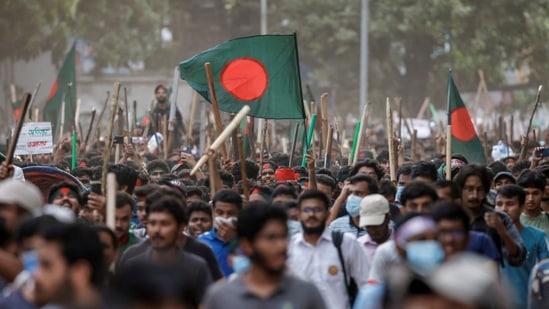Bangladesh student protests: Internet restored in country after 10 days
Internet connection was restored in Bangladesh after being restricted for 10 days amidst the nationwide violence over quota reforms in government jobs.
Mobile internet connection in Bangladesh was restored on Sunday, 10 days after being restricted by the Sheikh Hasina government to prevent the spread of fake news amid student protests against quota reforms.

Also Read: Bangladesh protests Mamata Banerjee's ‘shelter’ remark, calls it ‘provocative’: Reports
Bangladesh's minister of state for information and communication technology (ICT), Zunaid Ahmed Palak, said that 5GB internet would be provided for free to all users in the country for three days, the Dhaka Tribune reported.
Also Read: ‘Don’t teach me': Mamata Banerjee on MEA's criticism for statement on Bangladesh
Mobile internet connectivity was restored in the country at 3:00 pm local time on Sunday for users of Robi, Grameenphone, Banglalink and other operators in Dhaka.
Also Read: Bangladeshi YouTuber's guide to illegal entry into India goes viral, sparks outrage
Mobile internet was shut down by the Bangladesh government on July 18 due to rising violence across the country.
According to ICT minister Palak, the decision was made "in light of the current crisis in the country and to stop the spread of fake news on social media", The Daily Star reported.
The Department of Disaster Management building was set on fire during protests, which was adjacent to a data centre. The Internet Service Providers Association of Bangladesh (ISPAB) said that the fire might cut 30-40 per cent of the bandwidth supply in the country.
Broadband internet connection was disrupted within an hour. The country remained disconnected from both broadband and mobile internet from July 18 to 23.
Broadband internet was restored in stages but mobile internet remained unavailable until Sunday.
Palak added that the Bangladesh Telecommunication Regulatory Commission (BTRC) had sent letters to officials from Facebook, Tiktok and YouTube.
"Their representatives have to come to Dhaka by July 31 to give explanations. Then, after discussing it with them, we will make a decision,” he said.
Violent clashes began in Bangladesh between the police and students protesting against reforms to quotas for government jobs, which provided 30 per cent reservation to relatives of veterans who fought in Bangladesh's War of Independence in 1971.
The violence has reportedly led to a death toll of more than 150 people, according to local newspapers but no official figures are available.
On Monday, the Supreme Court court reduced the veterans' quota to 5 per cent. With 2 per cent reservations for ethnic minorities, transgender people and physically challenged people, 93 per cent of government jobs will remain merit based.
On Tuesday, Prime Minister Sheikh Hasina backed her controversial orders to enforce a curfew and shoot-on-sight order. She said such tough measures were required to ensure the security of people and their property.
By Wednesday, traffic had returned to the streets of Dhaka and a few banks, garment factories, etc had also reopened, signaling a slow return to normalcy.






